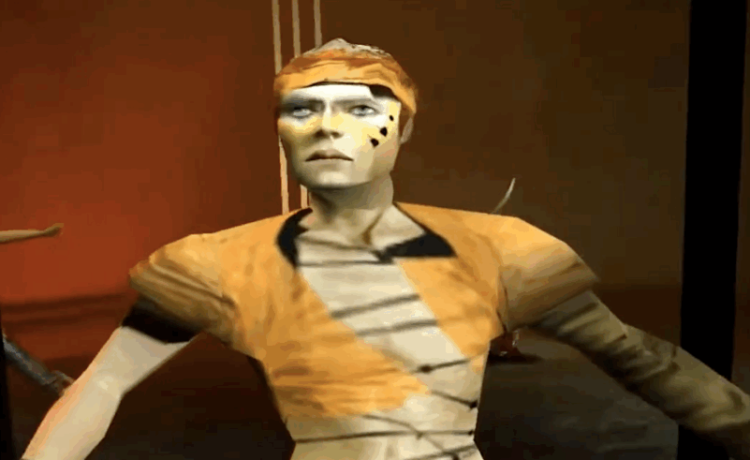When it was announced that SARS-CoV‑2, the virus at the center of the COVID-19 pandemic, had evolved into an even more contagious variant called Omicron, public reactions varied. For those of us with long memories of computer and video gaming, it brought to mind a title we hadn’t thought about in quite some time: Omikron: The Nomad Soul, released for Windows in 1999 and the Sega Dreamcast in 2000. More than a few gamers know it as the debut of controversial designer David Cage, whose studio Quantic Dream has gone on to produce various games of considerable cinematic and emotional ambit (if also an often frustrating eccentricity). But it made a wider cultural impact at the time by incorporating the performance of none other than David Bowie.
Or rather, it incorporated performances, plural, by David Bowie: in the game, he used motion capture technology to play both Boz, the wholly digital leader of an ancient religious order, and the lead singer of the band The Dreamers, whose concerts (shown in the video above) the player can view here and there around the dystopian cyberpunk city of Omikron.
Originally, the developers had only gone to Bowie in order to license his songs for the game’s soundtrack, but, as explained in the mrixrt video below, the project so appealed to his technophilia that he proposed a much deeper involvement. That included recording a set of original songs, later included on his album Hours… (which is itself notable in the history of technology and culture for being one of the first downloadable releases by a major artist).
Among its many novel qualities, including pioneering the “open world” environment now standard in big-budget games, Omikron grants the player — as the titular “nomad soul” — the ability to inhabit the bodies of a host of other characters (including one played by Bowie’s wife Iman). It isn’t hard to imagine the concept’s appeal for a performer who made his name with frequent changes of identity — and who even suggested, at one point, that he leave that name behind in the reality of the game, re-emerging into public life as David Jones. By the time he died, the better part of two decades later, his role in gaming was mostly forgotten, but one of the many tributes paid to him included a free re-release of Omikron. Those who took the chance to revisit the game would have remembered the feeling it first gave them that its digital world continued even when they weren’t playing — accompanied by a sense that, somehow, Bowie continues to live within it.
Related content:
When David Bowie Launched His Own Internet Service Provider: The Rise and Fall of BowieNet (1998)
A Tour of the New David Bowie Archive Featuring 90,000 Artifacts from His Life & Career
How David Bowie Used William S. Burroughs’ Cut-Up Method to Write His Unforgettable Lyrics
The David Bowie Monopoly Game Is Here: Advance to GO and Collect 200 Hunky Dorys!
Based in Seoul, Colin Marshall writes and broadcasts on cities, language, and culture. His projects include the Substack newsletter Books on Cities and the book The Stateless City: a Walk through 21st-Century Los Angeles. Follow him on the social network formerly known as Twitter at @colinmarshall.















